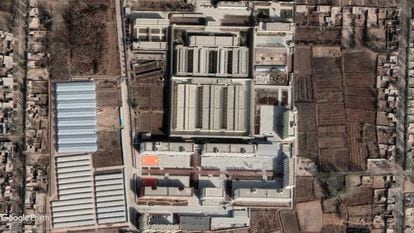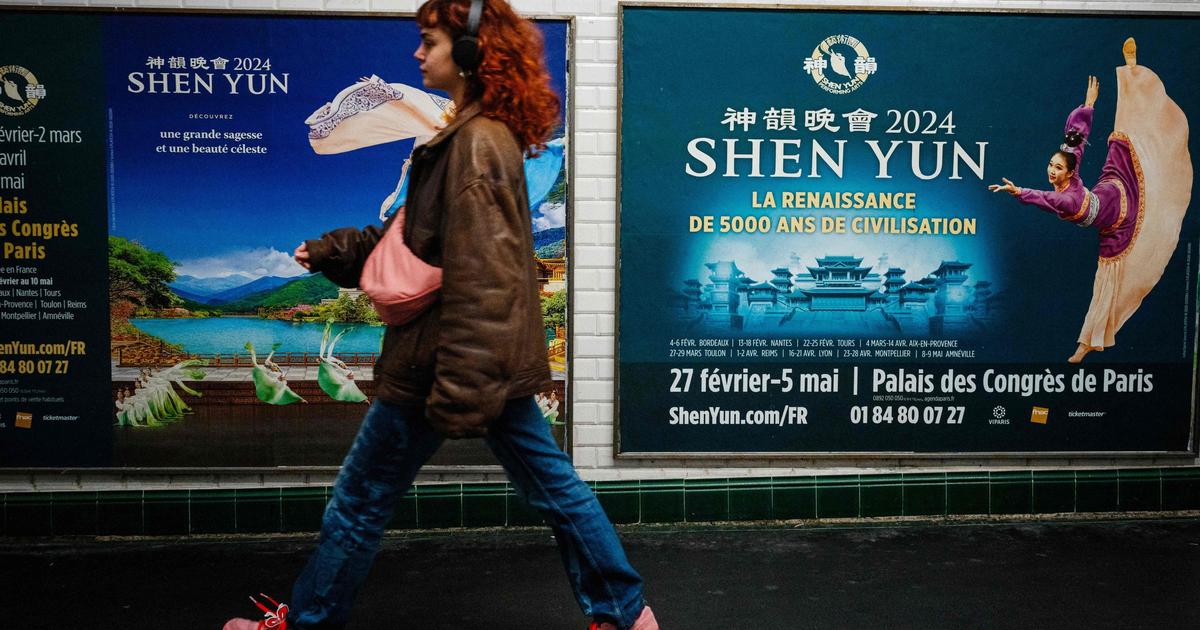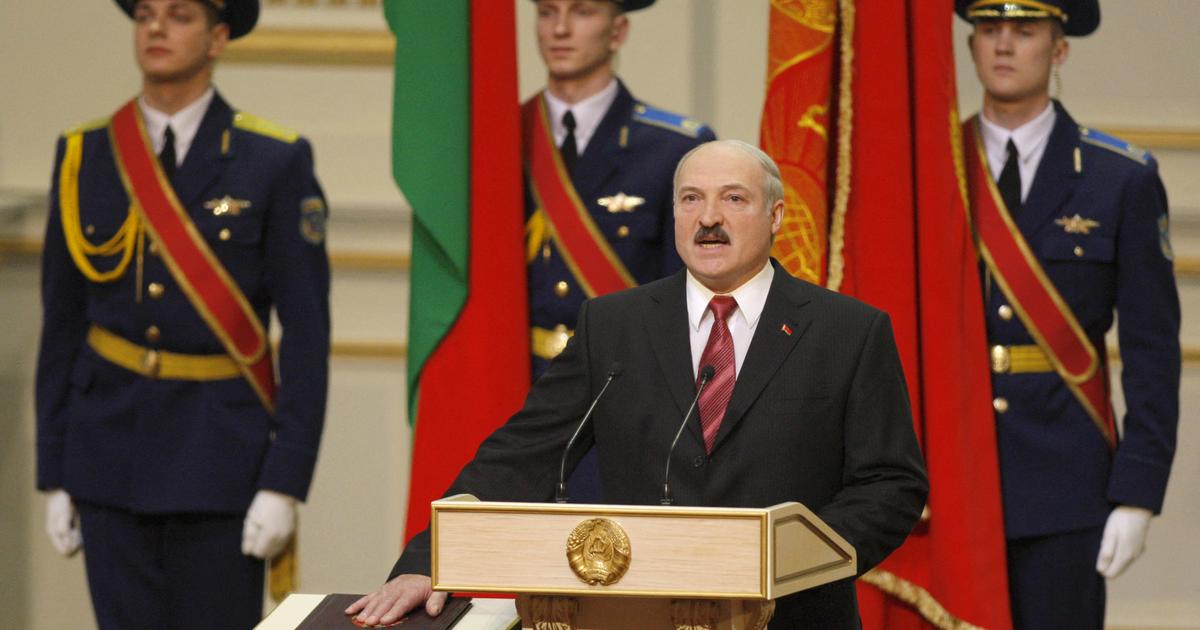China's extensive and brutal campaign of repression against Xinjiang's Uyghur Muslim minority is taking on a face for the first time.
Tens of thousands of police files, photographs and official documents of senior officials of the Communist Party of China (PCCh) to which EL PAÍS has had access offer unparalleled proof of the magnitude of the prison system established in this region of China's western fringe and the paranoia that guides Beijing's policies against ethnic minorities.
The journalistic investigation of this archive, led by the German academic and expert in the analysis of Chinese oppression policies in the area, Adrian Zenz, in collaboration with 14 media outlets from 11 countries, under the title
The Xinjiang Police Archives
, allows the identification of thousands of inmates in re-education centers built by China, including minors;
classify the charges, most of them of little consistency, that keep them behind bars;
show through images taken inside the facilities the practices of detention, interrogation and mistreatment carried out by the agents against the prisoners;
the instructions for the police exercise in the centers typical of the prison routine, and, finally, to analyze the transcript of public speeches of the top leaders of the PCCh in Xinjiang, among them its secretary general Chen Quanguo, in which it is supported, following the instructions from Beijing, the doctrine of maximum security against prisoners, who will even be shot "to kill" if they attack the camps or try to escape.
More information
Gender: male;
Age between 20 and 30 years;
ethnicity: Uyghur.
This is the X-ray of inmates in Chinese reeducation centers
"Behind this systematic repression," Zenz points out in a telephone conversation with EL PAÍS, "is the fear and paranoia expressed by [Chinese President] Xi Jinping about the resistance of the Uyghurs to the State's attempt to control them."
According to the study carried out by this academic, a member of the Foundation in Memory of the Victims of Communism, based in Washington, the confinement of Uyghurs in re-education camps is the "largest internment of a religious ethnic minority since the Holocaust".
At least one million citizens, most of them Uyghurs, have been locked up in re-education camps scattered across the geography of Xinjiang, according to a figure agreed by journalists, academics and the United Nations.
The Xinjiang police files
have been obtained by an anonymous outside source through sophisticated hacking operations into computer systems operated by the Chinese Police, the Public Security Bureau (PSB), in Konasheher counties, located in the prefecture of Kashgar, and Tekes, in Ili Kazakh prefecture.
The person responsible for this
hack
, who prefers not to identify himself for security reasons, has acted on his own initiative, without conditions or mandate from any of the researchers involved in the project.
The documents and images have been verified by this group of journalists, as well as the existence of three re-education centers from which the files have been obtained, thanks to a geolocation process based on the photographs taken by the agents.
Police record of Ilham Ismayil, 27, locked up in the Industrial Park Reeducation Center, in Konasheher County, Xinjiang.
The prefecture of Kashgar, in the officially called Xinjiang Uyghur Autonomous Region, on the vertex of the border with Kazakhstan and Kyrgyzstan, is precisely one of the stops planned on the official trip initiated this Monday by the United Nations High Commissioner for Human Rights, former Chilean president Michelle Bachelet.
The visit of the re-education centers for Uyghurs, the majority ethnic group in this region of some 25 million inhabitants, is one of the fundamental demands made of Bachelet by organizations in defense of human rights.
The Xi government first acknowledged the existence of these facilities in the publication of a white paper (reference document that guides state policy) in October 2018. However,
Beijing rejects the accusations about the repression of minorities in Xinjiang and defends that these centers serve for the education and training of "students", who have freedom of movement.
The regime calls this type of prison boarding school "a center for education and training in professional skills."
12% of adults locked up
The Xinjiang police files
show a very different reality.
As an example, according to the analysis of the thousands of police files in Konasheher (the registry of the security services covers about 286,000 citizens, almost the entire population of this county), analyzed the census in the period 2017-2018, it is concluded that at least 12.3% of the adult population suffered some type of internment in re-education centers, detention centers (for inmates awaiting sentence), or prisons.
When asked about the content of the leak
,
a spokesman for the Chinese Embassy in the United States, Liu Pengyu, stated in an email the following: "Xinjiang affairs are related, in essence, to the fight against violent terrorism. , radicalization and separatism, not human rights or religion.
Facing the serious and complex anti-terrorism situation, Xinjiang has taken a series of decisive, solid and effective deradicalization measures.
As a result, Xinjiang has not seen any cases of violent terrorism for several years in a row."
The Xinjiang Police Files
They contain, among other documents, 5,074 portraits taken in police stations or confinement centers in Konasheher County between January 6 and July 25, 2018. This is one of the great contributions made by this research project to the study of repression China.
Of these photos, 4,989 have been attributed to a person with detailed information on file.
EL PAÍS has analyzed a final sample of 2,884 photographic records of detainees that have specific data attached in the files obtained from the information network of the Chinese OSP.
The bulk of internees are under 30 years of age (69%), a total of 2,001 citizens.
Men also predominate, 2,490 (86%), compared to women, 394 (14%).
This journalistic investigation joins another half dozen that since 2019 have tried to prove the magnitude of the systematic repression campaign carried out by the communist regime against the Uyghurs, an ethnic group that in its great majority professes Islam.
Xinjiang, which borders seven Central Asian countries to the west, is of special relevance to Beijing, firstly, because it is a commercial crossing point on its renewed Silk Road, and, secondly, for security reasons. : the so-called inner China is taken over, both in the social sphere, as well as in the political and economic sphere, by the majority Han ethnic group.
This region, located in the eastern part of historic Turkestan, between the Caspian Sea and the Gobi desert, with a history and culture linked to the Turkic peoples,
Satellite image of the facilities of a re-education center in Konasheher County, Xinjiang.
The relocation of Han citizens in an effort to change Xinjiang's demographics led to heavy fighting in the late 2000s.
One of the bloodiest episodes was the clash between Uyghur and Han ethnic groups in July 2009 in Urumqi, the region's capital, which ended with around 200 deaths.
After several attacks by armed separatist groups, Xi gave the green light in May 2014 to the campaign called
Hard Strike Against Violent Terrorism
, which encompasses the current scale of repression throughout the region.
The Uyghur citizen Abdurahman Hasan is one of the relatives who has confirmed the veracity of the police records by identifying his wife during an interview held in Istanbul (Turkey) with the British news channel BBC News, which is part of the media group behind of this investigation.
Hasan, a businessman from Kashgar who frequently traveled abroad, an activity that regularly arouses suspicion in Beijing, left Xinjiang in January 2017 amid a crackdown.
In the summer of that year, his wife, Tunsagul Nurmemet, then 21, was arrested, along with Hasan's mother.
According to her file, Nurmemet was convicted of "gathering a crowd to disrupt social order, picking fights and causing trouble."
"Her life was based on her family and she didn't interact much with others either,"
Hasan explained during the conversation in the Turkish city.
“She only visited relatives, I don't know if she had many friends.
She didn't have a big social network, how was she able to gather a crowd?
His sentence amounts to 16 years in prison.
The portrait obtained from
the Xinjiang police archives
shows an unrecognizable Nurmemet in relation to the ID photo available so far in databases of Uyghur victims of Chinese repression.
According to the information that Hasan received in that summer of 2017, his wife and his mother had been “taken to study”.
This version, the one in the study, coincides with many others heard by relatives of the disappeared from abroad.
This was the case with Nursiman Abdureshid, 33, interviewed by EL PAÍS also in Istanbul.
Her relatives appear in police records in Kashgar prefecture.
In the summer of 2017, Abdureshid, who had been living in Turkey for two years, learned from a call to relatives that his father and his younger brother had been taken to an “education program”.
The eldest of his brothers had been locked up since 2016 for an alleged uncovered debt.
They asked him not to call anymore, that his relatives were fine.
In June 2020, Abdureshid managed to get the Chinese embassy in Turkey to confirm the sentences imposed, all exceeding a decade behind bars.
“I asked what the reasons for which they had been sentenced were,” Abdureshid recounts during the interview, “and they told me that it was for 'disturbing social order' and that they might have the intention of participating in terrorist activities”.
The girl's father had been a state official and a member of the CCP.
She believes that her departure from Xinjiang, added to that of her other sister, who lives in the US, unleashed the repression against her family.
Chinese confidential documents leaked for the 'Xinjiang Papers' and 'The Xinjiang Police Files' investigations.
The Xinjiang police files
also contain dozens of photos taken by authorities and security services in Tekes County, Illi Kazakh prefecture.
A group of about thirty of these images, taken between April 2017 and September 2018, correspond to scenes immortalized inside the re-education center of that county.
Contrary to what is publicly exposed by Beijing, the action of the agents inside the facilities, their weapons and the treatment of the inmates is far from what is expected in a professional training center.
Handcuffs, hoods and the tiger's chair
In the photographs, the inmates are moved from one place to another hooded and with handcuffs on their wrists.
There are officers armed with sticks, usually of Uyghur ethnicity, but also with assault rifles and riot gear, usually carried by Han uniforms.
The interrogations, according to the reel of photos taken from Tekes, take place in what are known as tiger chairs, which are part of the repertoire of instruments used for torture in China, according to the NGO Human Rights Watch.
Various sequences of these documents show common practices already exposed in the
China Secret Cables leak.
, such as the injection of prisoners, in this case of men, normally for food supplies or analysis, as well as the obligation to recite the doctrine of the confinement camp daily or receive propaganda from local authorities in groups.
The number of inmates in reeducation centers estimated so far, one million citizens, could be very conservative, according to what was expressed in one of the most revealing political speeches included in the leak.
It is the one pronounced by the Minister of Public Security Zhao Kezhi during his visit to Urumqi, on June 15, 2018, and classified as a "secret document".
This transcribed file agrees with the information and photographs in the local press of the communist leader during his stay in the capital of Xinjiang.
Zhao, according to this paper, estimated during his appearance at two million Xinjiang citizens "influenced" by independence, as well as another two million by religious extremist thoughts.
They are two of the three "demons" that Beijing places in its particular axis of evil: terrorism,
Zhao welcomes the stabilization of Xinjiang through the
Strong Strike campaign against terrorists
– “as soon as they rear their heads”, says the Chinese minister.
The CCP leader reported during his speech that 20,000 "terrorists" had been "destroyed" - he does not specify who they were or their final destination - a number that exceeded the total of the previous 10 years by more than five times.
Zhao congratulated the leader of this "stabilization" campaign in Xinjiang, the general secretary of the CCP in the region (2016-2021), Chen Quanguo, sanctioned by the United States for violating the human rights of minorities. ethnic in Xinjiang.
A group of inmates at the Tekes Reeducation Center in Xinjiang recite while being watched by several officers in September 2017.
Chen, an example for Beijing for his performance in Tibet before taking office in Xinjiang, is considered the great architect of the repression against the Uyghurs and, especially, of the proliferation of re-education centers since 2017. The words of Chen in the speeches contained in
The Xinjiang Police Archives
give a faithful account of the level of oppression carried out in these facilities intended for punishment and confinement.
In one of his speeches before his family, on May 28, 2017, this communist leader describes internment in these centers as "humane" for the simple fact of having air conditioning and daily food rations, or even the possibility of receiving visitors.
Despite the fact that the analysis of the documents contained in the leak
The secret cables of China
led to the conclusion that the usual time of internment in re-education centers was one year, the Beijing envoy to the region questioned with his words that May 2017 even the freedom of some inmates.
"If they go out," Chen said, "problems come back immediately, that's the reality of Xinjiang."
The tone is more radical in a newly transcribed appearance dated June 18, 2018. “No one should ever plan to attack an internment facility,” Chen said, “as soon as there is someone moving [against centers] , fire must be opened with determination”.
In that same speech and recalling the violent acts in Urumqi in 2009, Chen argued that the security forces must act against those who defy the law under the premise "kill first and then report."
The words of the general secretary of the CCP in Xinjiang until last year did not fall on deaf ears.
Several documents included in the file memory obtained from the computer systems of the Chinese police in the area make Chen's doctrine a fundamental pillar in the protocols of action in the face of, for example, attempts to escape by "students", an obsession within the surveillance paranoia deployed by Beijing.
One of those papers relates how to deal with an escape: local authorities will be notified, roads will be closed and special forces will be sent.
"If the students do not listen to the advice," the instruction says, "the armed police may fire a warning shot."
If they persist in their attempt to escape, fire will be opened “to kill”.
“The re-education camps”, concludes Zenz, an academic who, for his study of the Chinese repression in Xinjiang, has been sanctioned by the Beijing authorities, “are designed to change the minds of the Uyghurs, their hearts, to undo the loyalty to its culture, history, its Turkic heritage, including religious faith;
change all that, nip it in the bud and steer it towards the Communist Party of China.”
Follow all the international information on
and
, or in
our weekly newsletter
.
Exclusive content for subscribers
read without limits
subscribe
I'm already a subscriber






/cloudfront-eu-central-1.images.arcpublishing.com/prisa/RSDYMJQAS5HZZJNOQTAQ3E4FYI.jpg)







